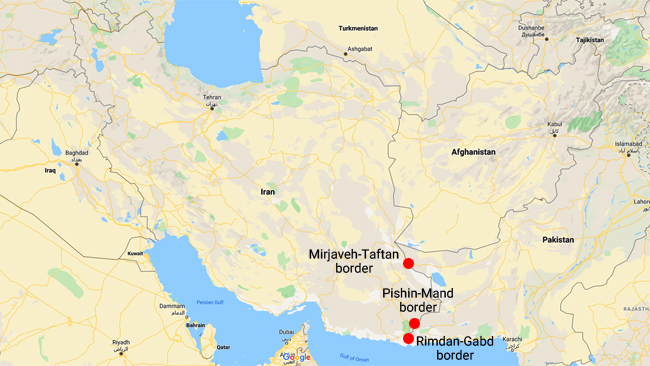Trade between Iran and Pakistan stood at $1 billion during the first 10 months of the current Iranian tear (March 20, 2020-Jan. 19), the head of the Trade Promotion organization of Iran said.
In a meeting with Pakistani Ambassador to Iran Rahim Hayat Qureshi, Hamid Zadboum added that bilateral trade declined due to the Covid-19 pandemic, but it has bounced back over the past three months, ILNA reported.
The two sides discussed ways of improving trade and border market infrastructures.
A Pakistani delegation is scheduled to pay a visit to Tehran next week to arrange the ninth joint economic commission meeting that will be held soon.
Turkish, Iranian and Pakistani officials agreed in December to revive the Istanbul-Tehran-Islamabad rail network, which was launched in 2009. The aim of the project is to enhance communication and trade links among the three countries.
So far, the train has conducted trial runs and officials signaled that it would be made operational soon.

The map shows the border crossings for trade between Iran and Pakistan
The 6,500-kilometer (4,030 miles) railroad will run 1,950 kilometers in Turkey, 2,600 kilometers in Iran and 1,990 kilometers in Pakistan.
Although ITI is not part of China's Belt and Road Initiative, experts say the rail link would eventually be incorporated into it.
Fatemeh Aman, an Iranian analyst at the Atlantic Council's South Asia Center, said if a proposed $400 billion (€329 billion) deal between China and Iran becomes reality, Beijing would need more projects like ITI to increase connectivity within the region.
"If China manages to take over the US's role in Asia, it will need a greater partnership with regional countries," she told DW.
Experts say ITI would increase connectivity among the three countries and make traveling much easier. It will take 11 days to travel from Istanbul to Islamabad via train than the sea route, which takes up to 21 days.
"ITI will make travel easier and safer than long-distance bus services. In the long term, it will possibly make the journey cheaper for pilgrims and more enjoyable than air travel," Lukasz Przybyszewski, a West Asia analyst at the Warsaw's War Studies Academy, told DW.
Aman believes that if the project becomes operational, it will dramatically increase connectivity among Turkey, Iran and Pakistan.
"It will expedite cargo and container transportation, shorten travel time and save cost," Aman said.